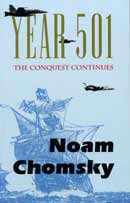
Year 501
The Conquest Continues
Chomsky, Noam
Publisher: Black Rose Books, Montreal, Canada
Year Published: 1993
Pages: 332pp ISBN: 1-895431-62-X
Library of Congress Number: D842.C48 1992 Dewey: 327.1
Resource Type: Book
Cx Number: CX7030
An examination of the U.S. role in the world placed in the long historical perspective of the 500 years that followed the voyages of Columbus.
Abstract:
Year 501 is an examination of the history of the past 500 years, from the 'discovery' of the New World, to modern society. It looks especially at the role of the U.S. through this time. Chomsky links the murder and exploitation of modern imperialism to the genocide of colonial times. Examining such events as the independence of Cuba, the slave revolt in Haiti, and other times in which the U.S. interfered with Latin American countries, Chomsky analyzes common themes in American foreign policy.
The book is divided into four parts. Part 1: Old Wine, New Bottles describes Europe's conquest of the world, the Old World Order, and the injustices of the Europeans against the native peoples. The power of the U.S after colonialism is also discussed. Part 2 is called High Principles and includes chapters entitled "Democracy and the Market", and "Human Rights: The Pragmatic Criterion". Part 3, Persistent Themes, talks about oppression of the natives, slavery, the idea of the U.S. burden of responsibility, the U.S. opposition to Cuban independence, and, in modern times, the lack of fair trade. The last section is called Memories, which discusses the effects of censoring history. Statistics and facts from various sources support Chomsky's case.
"The genocidal episodes of the Columbian-Vasco de Gama era are by no means limited to the conquered regions of the South, as is sufficiently attested by the exploits of leading centre of Western civilization 50 years ago. Throughout the era, there have been savage conflicts among the core societies of the North, sometimes spreading far beyond, particularly in this terrible century." Just as the crimes of colonialism are not limited geographically, they are not limited temporally.
[Abstract by Mia Manns]
Table of Contents
Part I - Old Wine, New Bottles
Chapter 1: "The Great Work of Subjugation and Conquest"
Chapter 2: The Contours of World Order
Chapter 3: North-South/East-West
Part II - High Principles
Chapter 4: Democracy and the Market
Chapter 5: Human Rights: The Pragmatic Criterion
Part III - Persistent Themes
Chapter 6: A "Ripe Fruit"
Chapter 7: World Orders Old and New: Latin America
Chapter 8: The Tragedy of Haiti
Chapter 9: The Burden of Responsibility
Part IV - Memories
Chapter 10: Murdering History
Chapter 11: The Third World At Home
Glossary
Notes
Bibliography
Index
Subject Headings


